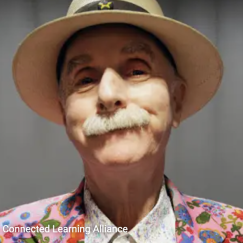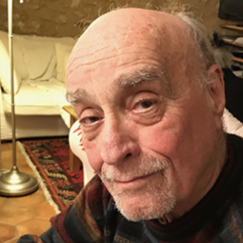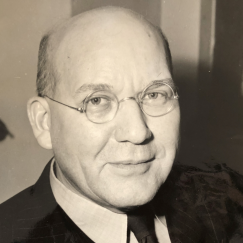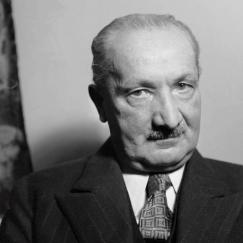The opportunistic teacher who embraces the leisure interests of his pupils in the hope of leading them to higher things is as frequently unsympathetic to the really valuable qualities of popular culture as his colleague who remains resolutely hostile. A true training in discrimination is concerned with pleasure.
Bio/Short Description
Martin Heidegger was a German philosopher widely acknowledged to be one of the most original and important philosophers of the 20th century. Heidegger is best known for his contributions to phenomenology and existentialism. In Being and Time (1927), Heidegger explores ontological questions about Being, wondering what it means for something to be.
HOW THEY INFLUENCED YOU?
External Links
Other Grandparents
 ColinPosted By: Renee HobbsOn:07/13/2025 - 00:50
ColinPosted By: Renee HobbsOn:07/13/2025 - 00:50
 BillPosted By: Renee HobbsOn:06/29/2025 - 20:45
BillPosted By: Renee HobbsOn:06/29/2025 - 20:45
 HowardPosted By: Renee HobbsOn:01/27/2024 - 22:47
HowardPosted By: Renee HobbsOn:01/27/2024 - 22:47
 Gary Posted By: Renee HobbsOn:01/01/2024 - 00:39
Gary Posted By: Renee HobbsOn:01/01/2024 - 00:39
 Clyde Posted By: Renee HobbsOn:04/04/2023 - 18:16
Clyde Posted By: Renee HobbsOn:04/04/2023 - 18:16



David Weinberger
As a young college student in 1968, my identity crisis was a doozy. At the time, I couldn’t tell how much of me was an act for other people and how much of it was real. I could spend a long time weighing every thought, assessing whether it expressed something really real about me or was just another shiny surface in my mind’s hall of mirrors. That was fairly typical of identity crises, but for whatever quirk, I experienced mine as despair that all meaning is a human projection. See that fork lying over there? It’s only a fork because we happen to take it as a fork. If we were the size of field mice, it’d be a seesaw. (It didn’t help that 1968 was the year I started smoking pot.) See that tree? We say it’s a tree, but that’s because we choose to see it as something separate from the ground and air. We only think it’s a whole, complete entity with leaves and roots because we choose to see the roots as distinct from the molecules constantly going across its “borders.” In fact, we can see the tree in its entirety only when it has been uprooted. Our meaning of things (that’s “meaning” as a verb) comes from uprooting them. Meaning is an act of violence. Dude.
The positive side of this was that it fueled my early pacifism: if humans are the source of all judgments about meaning and value, to kill a person is to kill the most valuable thing there is. This—plus principled opposition to the Vietnam War and a huge dose of cowardice—led me to apply to my local Draft Board to be classified as a conscientious objector. (They granted my application, and a few months later I won the newly instituted draft lottery, thus avoiding military service. My identity crisis also made me a certain type of boy that a certain type of girl found appealing. I am not proud of any of this.
Nor was it fun. If a fork had no real meaning, how could life? Why should I decide to become a doctor instead of a bank robber? Why should I butter my toast instead of feeding it to the ants? At least the ants knew what to do with it. Why should I get up? Or go to sleep? If killing myself had held any more meaning than living, I would have been suicidal.
Fortunately, mine was an equal-opportunity nihilism. My pacifism told me that I was the source of all the value I experienced, and my nihilism told me that for that very reason, the value wasn’t real. I was brought out of this funk by Martin Heidegger, thanks to a course I took a course from Professor Joseph P. Fell at Bucknell University. Professor Fell was interested in the Big Questions—and he still is—but not in the way freshmen sitting around a dorm room are. Professor Fell is a scholar who reads Greek, Latin, German, and French and has read deeply in Western philosophy. His course was rigorous, informed by the great minds of our culture, and was a model of what it means to seek to understand something. From that course, I began to see how much of my despair was, in fact, a silent inheritance from our intellectual history.
Professor Fell taught a course on Heidegger’s Being and Time ([1927] 2010), which is a fairly ridiculous thing to do at a small college that graduated only a handful of philosophy majors. Being and Time is notoriously difficult. It addresses the broadest question there is: What does it mean for anything to be?
Heidegger brought me out of my teenage angst. I saw that the world wasn’t the illusion. The illusion was that I lived inside a hollow skull, trying to wring meaning from meaningless experience and from the echoes of arbitrary squawks and squiggles emitted from other hollow skulls. As a result of questioning the idea that communication overcomes fundamental isolation, I was reminded of the more important truth: we are always already together in a shared world about which we all care, but care differently.
What does this re-understanding of the nature of communication mean for digital-media literacy? The prior idea of media literacy pictured students reading a newspaper (ah, the old days!) or watching TV by themselves, prey to all the ways that advertisers and propagandists lie to us. We still need to learn how to encounter media on our own, but we should also recognize that generally we now read in a shared space, with other people. What we read comes from them, via links and tweets and all the other ways we recommend places on the net to one another. What we read comes filtered through others who often comment on it, guiding our understanding and attitude. Our network does much of the hard work of spotting traps and exposing liars, whether it’s through a Reddit thread contradicting a hyperbolic headline or a response on Facebook that links to a contrary source.
So, while we still need to sharpen our skills, we also need to figure out how to make the networked space better at discovering the truth and swerving around the lies. Our fundamental image should no longer be that of an isolated student facing an onslaught of lies. Rather, it should be that of a shifting network of people with a shared interest, showing one another how the world looks to them. Media literacy needs to produce not just literate individuals but networks that are better at telling the truth—which means they’re better at letting us see the world together and helping us care about it more.